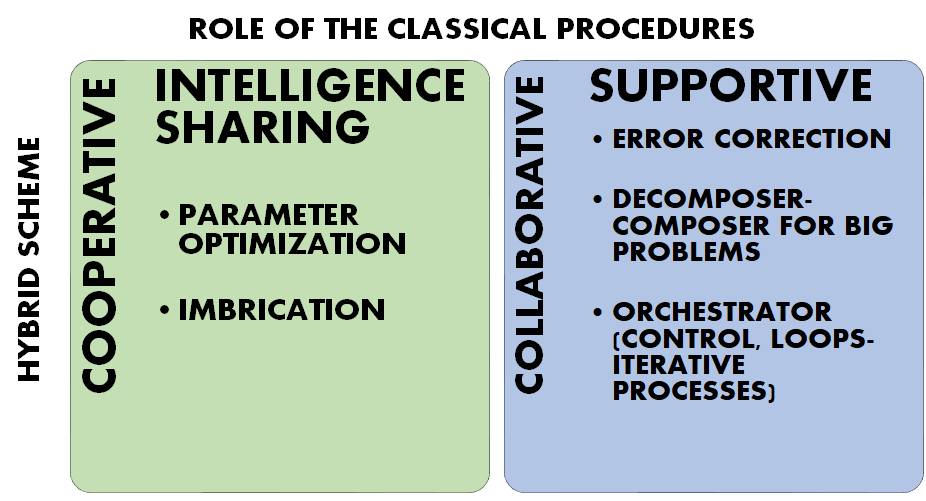Hybrid Quantum Solvers in Production: how to succeed in the NISQ era?
2401.10302

0
0

Abstract
Hybrid quantum computing is considered the present and the future within the field of quantum computing. Far from being a passing fad, this trend cannot be considered just a stopgap to address the limitations of NISQ-era devices. The foundations linking both computing paradigms will remain robust over time. The contribution of this work is twofold: first, we describe and categorize some of the most frequently used hybrid solvers, resorting to two different taxonomies recently published in the literature. Secondly, we put a special focus on two solvers that are currently deployed in real production and that have demonstrated to be near the real industry. These solvers are the LeapHybridBQMSampler contained in D-Wave's Hybrid Solver Service and Quantagonia's Hybrid Solver. We analyze the performance of both methods using as benchmarks four combinatorial optimization problems.
Create account to get full access
Introduction
![Figure 1: Classification of HS schemes. Image taken from [5].](https://arxiv.org/html/2401.10302v1/extracted/5354993/images/hybrid_taxonomy.png)
Classifying hybrid solvers: Where might the quantum advantage be?


Experimentation
V Conclusions & Further Work
This summary was produced with help from an AI and may contain inaccuracies - check out the links to read the original source documents!
Related Papers
❗
Hybrid quantum-classical computation for automatic guided vehicles scheduling
Tomasz 'Smierzchalski, {L}ukasz Pawela, Zbigniew Pucha{l}a, M'aty'as Koniorczyk, Bart{l}omiej Gardas, Sebastian Deffner, Krzysztof Domino

0
0
Motivated by global efforts to develop quantum computing for practical, industrial-scale challenges, we showcase the effectiveness of state-of-the-art hybrid quantum-classical solvers in addressing the business-centric optimization problem of scheduling Automatic Guided Vehicles (AGVs). These solvers leverage a noisy intermediate-scale quantum (NISQ) device, specifically a D-Wave quantum annealer. In our study, the hybrid solvers exhibit non-zero quantum processing times, indicating a significant contribution of the quantum component to solution efficiency. This hybrid methodology performs comparably to existing classical solvers, thus indicating `quantum readiness' for scheduling tasks. Our analysis focuses on a practical, business-oriented scenario: scheduling AGVs within a factory constrained by limited space, simulating a realistic production setting. Our new approach concerns mapping a realistic AGV problem onto a problem reminiscient of railway scheduling and demonstrating that the AGV problem more suits quantum computing than the railway counterpart and is more dense in terms of an average number of constraints per variable. We demonstrate that a scenario involving 15 AGVs, which holds practical significance due to common bottlenecks like shared main lanes leading to frequent deadlocks, can be efficiently addressed by a hybrid quantum-classical solver within seconds. Consequently, our research paves the way for the near-future business adoption of hybrid quantum-classical solutions for AGV scheduling, anticipating that forthcoming improvements in manufacturing efficiency will increase both the number of AGVs deployed and the premium on factory space.
5/9/2024

Utilising a Quantum Hybrid Solver for Bi-objective Quadratic Assignment Problems
Mayowa Ayodele

0
0
The intersection between quantum computing and optimisation has been an area of interest in recent years. There have been numerous studies exploring the application of quantum and quantum-hybrid solvers to various optimisation problems. This work explores scalarisation methods within the context of solving the bi-objective quadratic assignment problem using a quantum-hybrid solver. We show results that are consistent with previous research on a different Ising machine.
5/29/2024
🌀
Paving the Way to Hybrid Quantum-Classical Scientific Workflows
Sandeep Suresh Cranganore, Vincenzo De Maio, Ivona Brandic, Ewa Deelman

0
0
The increasing growth of data volume, and the consequent explosion in demand for computational power, are affecting scientific computing, as shown by the rise of extreme data scientific workflows. As the need for computing power increases, quantum computing has been proposed as a way to deliver it. It may provide significant theoretical speedups for many scientific applications (i.e., molecular dynamics, quantum chemistry, combinatorial optimization, and machine learning). Therefore, integrating quantum computers into the computing continuum constitutes a promising way to speed up scientific computation. However, the scientific computing community still lacks the necessary tools and expertise to fully harness the power of quantum computers in the execution of complex applications such as scientific workflows. In this work, we describe the main characteristics of quantum computing and its main benefits for scientific applications, then we formalize hybrid quantum-classic workflows, explore how to identify quantum components and map them onto resources. We demonstrate concepts on a real use case and define a software architecture for a hybrid workflow management system.
4/17/2024
🎯
Resource-Efficient and Self-Adaptive Quantum Search in a Quantum-Classical Hybrid System
Zihao Jiang, Zefan Du, Shaolun Ruan, Juntao Chen, Yong Wang, Long Cheng, Rajkumar Buyya, Ying Mao

0
0
Over the past decade, the rapid advancement of deep learning and big data applications has been driven by vast datasets and high-performance computing systems. However, as we approach the physical limits of semiconductor fabrication in the post-Moore's Law era, questions arise about the future of these applications. In parallel, quantum computing has made significant progress with the potential to break limits. Major companies like IBM, Google, and Microsoft provide access to noisy intermediate-scale quantum (NISQ) computers. Despite the theoretical promise of Shor's and Grover's algorithms, practical implementation on current quantum devices faces challenges, such as demanding additional resources and a high number of controlled operations. To tackle these challenges and optimize the utilization of limited onboard qubits, we introduce ReSaQuS, a resource-efficient index-value searching system within a quantum-classical hybrid framework. Building on Grover's algorithm, ReSaQuS employs an automatically managed iterative search approach. This method analyzes problem size, filters fewer probable data points, and progressively reduces the dataset with decreasing qubit requirements. Implemented using Qiskit and evaluated through extensive experiments, ReSaQuS has demonstrated a substantial reduction, up to 86.36% in cumulative qubit consumption and 72.72% in active periods, reinforcing its potential in optimizing quantum computing application deployment.
5/8/2024